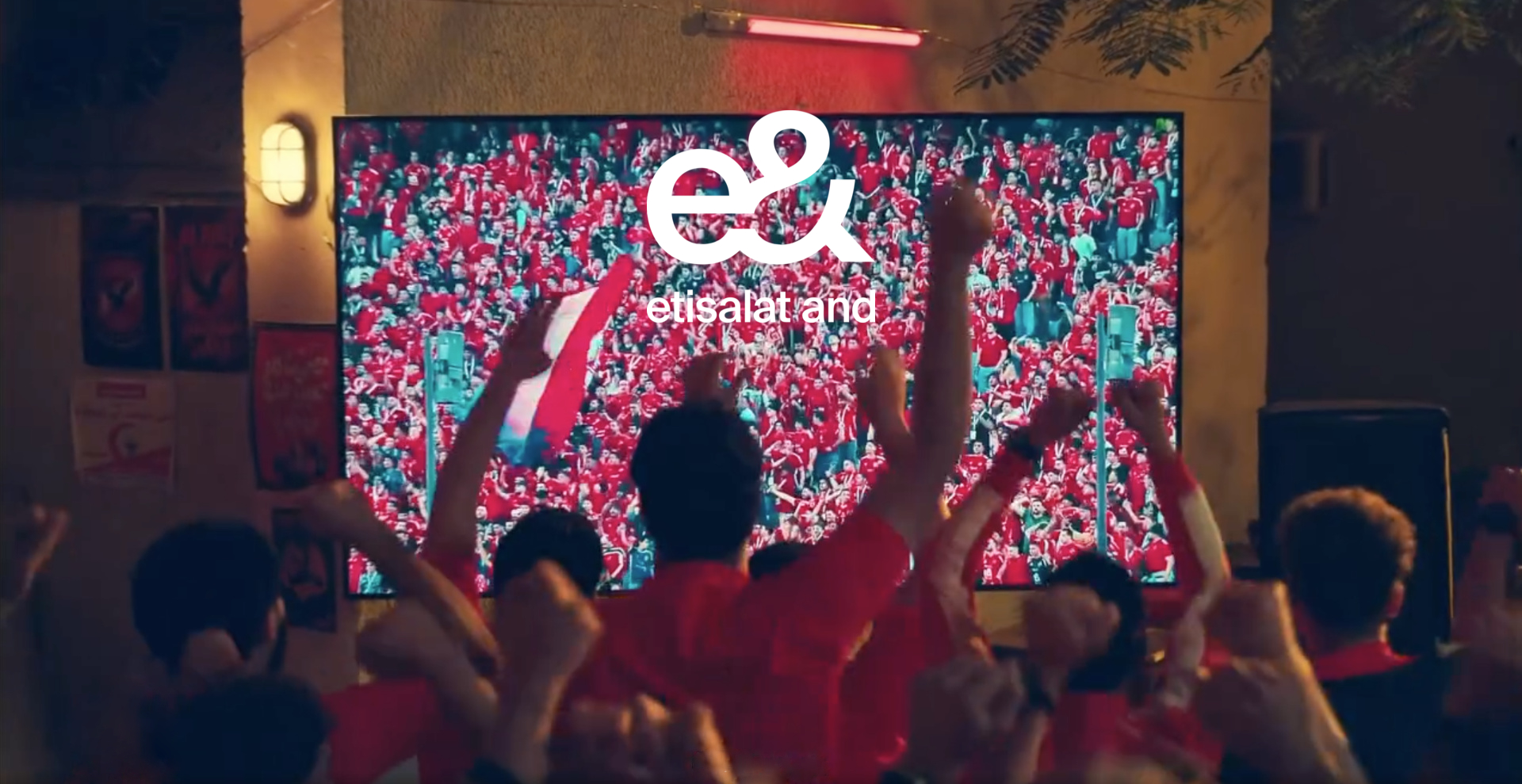In May 2025, Etisalat Egypt, rebranded as “e&”, unleashed a wave of outrage with an ad campaign that brazenly aligned itself with Al Ahly, one of Egypt’s most popular football clubs. In a country where football allegiance is tribal, this was no harmless move. For many fans of Zamalek SC, Al Ahly’s fiercest rival, the ad felt like a deliberate insult. As expected, the backlash was swift and massive. The company removed the ad, issued a hasty apology, and watched as its reputation plummeted among a significant portion of its consumer base.
But what really happened here? Why would a company with such vast reach risk alienating millions? And what does this say about the state of marketing today? especially concerning the careful crafting of a brand identity?”
The Cost of Misalignment: A Branding Reflection
At first glance, the ad looked like a win: sleek production, popular celebrities, and a powerful message of pride and identity. But the deeper issue was its exclusionary tone. Instead of celebrating unity, the campaign pitted one side of Egypt’s passionate football culture against the other.
This wasn’t just a tone-deaf move, it was a fundamental misunderstanding of branding in a polarized environment. It’s estimated that nearly half of Egypt’s football fans support Zamalek. That means e& effectively insulted or dismissed a huge portion of its potential market. No amount of high-definition video or celebrity power can justify such a risk.
Zamalek Fans: From Customers to Critics
The response from Zamalek supporters was ferocious and organized. Thousands took to social media calling for boycotts, tagging e& in posts filled with criticism, and sharing screenshots of canceled subscriptions. Many accused the brand of reinforcing a pattern of systemic bias, not only in football but in national media and sponsorship as well.
This wasn’t just about hurt feelings. It was about identity, inclusion, and fairness, values that brands must respect to remain relevant.
The Real Cost of Going Viral
The marketing logic behind this campaign appears to have been simple: provoke, go viral, gain attention. But virality without values is a dangerous game. This is especially true in Egypt, where socio-political tensions, economic challenges, and emotional attachments to sports make branding an exercise in sensitivity and diplomacy.
The immediate fallout included:
- Tens of thousands of unsubscribes or public boycott pledges
- Loss of trust in e& among a massive segment of consumers
- A wave of negative media coverage
- A reactive, rather than proactive, PR crisis management campaign
There’s a difference between sponsoring a club or any other entity and maintaining your identity as a company, versus merging your identity with that entity and allowing it to overshadow your own — especially when that entity hasn’t done the same in return. This is very noticeable on e&’s social media pages, where the colors, messaging, and football have become a major part of the company’s marketing strategy.
In addition to altering their brand identity, they’ve also begun openly promoting division, as seen in their latest advertisement, which clearly stirred conflict between the fanbases of two major clubs: Al Ahly and Zamalek.
Was the temporary engagement worth this scale of damage? Clearly not.
Timing Is Everything: A Tone-Deaf Release Amid Crisis
What makes the e& campaign even more controversial is its timing. Released during a period of horrific violence and humanitarian catastrophe in Gaza, the ad landed as an unnecessary provocation while Arab audiences were focused on suffering and solidarity.
Why choose this moment for a divisive campaign that pits fans against each other? The insensitivity of the launch timing raises legitimate questions about intent. Was it an attempt to distract from greater issues or simply a lack of internal checks and awareness? Either way, the brand failed to read the emotional temperature of the region.
Zain’s Campaigns: A Masterclass in Ethical Branding
For contrast, look to Zain, the Kuwaiti telecom giant known for its annual Ramadan campaigns. Zain doesn’t shy away from emotion, but it channels it with purpose. Their pro-Palestinian campaigns focus on human rights, empathy, and regional unity. They are emotionally provocative but ethically grounded.
Zain’s ads succeed because:
- They highlight a cause that unites rather than divides.
- They align the brand with shared values of justice and humanity.
- They show courage without insulting or excluding.
The key difference? Zain builds community, while e& exploited rivalry. One chooses meaningful engagement; the other chose spectacle.
Marketing in Egypt: Not Just a Game of Numbers
Egypt is not a homogenous market. Its consumers are emotionally connected to brands, but also deeply aware of political, cultural, and societal undercurrents. Brands that overlook this complexity lose more than just viewers, they lose trust.
The e& campaign failed to grasp this. It opted for shock over sincerity, controversy over coherence, and speed over strategy. Worse, it missed an opportunity to unify rather than divide.
When Controversy Is the Strategy, Ethics Must Be the Defense
Marketing is not just about visibility; it’s about responsibility. In today’s world, where social impact and brand ethics are under constant public scrutiny, every message counts. Consumers expect more from brands, they expect awareness, respect, and a role in shaping better conversations.
Brands like e& must ask themselves:
- Who are we speaking to?
- Who are we excluding?
- What values do we reinforce?
- What legacy are we building?
Certainly, Here’s an English-language analysis of e& Egypt’s social media statement, including a critical perspective. You can include it as a standalone section in your article:
When an Apology Isn’t Enough: Analyzing e&’s Official Statement
In response to the backlash, e& Egypt released an official clarification on its social media platforms. The statement read:
Clarification
e& Egypt would like to issue a clarification regarding the recent advertising campaign, which included elements that were interpreted in ways not intended by the company.
The company affirms its respect and appreciation for all Egyptian sports fans and states that this interpretation does not reflect the company’s intent or the campaign’s objective.
Finally, the company reiterates its full respect for all Egyptian sports clubs and organizations, as part of its core values.
At first glance, the statement may appear diplomatic, but upon closer inspection, it falls short in several critical ways.
1. Deflecting Responsibility
The language used subtly shifts the blame to the audience, suggesting the controversy arose from a “misinterpretation” rather than a misjudgment by the company. This phrasing avoids taking full responsibility for the creative decisions that triggered the backlash. It implies that the problem lies with how viewers perceived the message, rather than with the message itself.
2. Lack of Empathy
There’s no direct acknowledgment of the depth of offense caused, particularly to Zamalek fans who felt mocked or excluded. The tone is cold and corporate, lacking any real sense of empathy, remorse, or understanding of the emotional impact the ad had on a passionate community.
3. Vague and Non-Committal
The statement uses vague, passive phrasing like “elements that were interpreted in ways not intended,” instead of clearly naming the issue and promising corrective steps. There’s no mention of specific actions being taken, no internal review, no restructuring of creative processes, just a general assurance of “respect.”
4. Missed Opportunity to Rebuild Trust
This could have been an opportunity for e& to connect with audiences, show humility, and demonstrate leadership. Instead, the brand chose a minimalist, defensive tone that did little to repair the emotional damage. In a social media age where transparency and authenticity matter more than ever, this response felt like a checkbox, not a commitment.
Our Take: Words Without Weight
In times of crisis, brands must communicate with honesty, humanity, and clarity. e&’s statement reads more like a legal disclaimer than a heartfelt apology. Without a sincere tone or actionable follow-up, the brand risks deepening the divide it has created. In emotionally charged markets like Egypt, especially around football, brands cannot afford to be this tone-deaf. Rebuilding trust will require far more than a cold clarification, it will require listening, change, and consistent respect for the audience’s emotional realities.
A Final Word: From Crisis to Course Correction
This incident should serve as a wake-up call, not just for e&, but for all regional brands navigating the thin line between bold and blind. Controversy may generate clicks, but it doesn’t build communities. And in a time of global and local upheaval, communities are what matter most. This isn’t about Ahly and Zamalek, it’s about ethics. Anyone with a sense of ethics would find the ad inappropriate.
To regain trust, e& will need more than apologies. It must show commitment to inclusion, fairness, and thoughtful communication. And perhaps most importantly, it must learn that in Egypt, football is never “just a game.”



